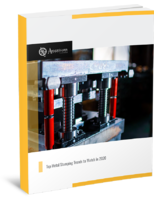ASTM Standard addresses calibration of nuclear density gauges.
Press Release Summary:
Developed by Subcommittee D18.08, part of Committee D18 on Soil and Rock, ASTM D7759 provides guidance for calibration of nuclear density gauges, which are used to measure density, moisture content, and inner structure of material. Verification of gauges is necessary to indicate when mathematical relationship between in-place density reading and water mass per unit volumes indicated by gauge need to be adjusted so that calibration meets required level of measurement uncertainty.
Original Press Release:
ASTM Soil and Rock Committee Approves New Standard for Nuclear Surface Moisture and Density Gauge Calibration
W. CONSHOHOCKEN, Pa., — A new ASTM International standard provides guidance for the calibration of nuclear density gauges, which are used in a variety of situations to measure the density, moisture content and inner structure of material.
ASTM D7759, Guide for Nuclear Surface Moisture and Density Gauge Calibration was developed by Subcommittee D18.08 on Special and Construction Control Tests, part of ASTM International Committee D18 on Soil and Rock.
Gauge calibration is performed to formulate two different mathematical equations:
• A density calibration equation, which relates the gauge density system response to the soil-equivalent density of the standard on which this response is elicited, and
• A water content calibration, which relates the gauge water content system response to the water mass per unit volume value of the standard on which this response is elicited.
Gauge calibration is also performed to ensure that the gauge has an in-place water mass per unit volume gauge precision level and a density precision level that are consistent with typical gauge response.
The verification of gauges is necessary to indicate when the mathematical relationship between the in-place density reading and the water mass per unit volumes indicated by the gauge need to be adjusted so that the gauge calibration meets the required level of measurement uncertainty.
According to James Pratt, senior nuclear project physicist, Troxler Electronic Laboratories, and a D18 member, ASTM D7759 will provide users and calibrators with better guidance in comparative evaluations between existing calibration and verification methods and any methods to be developed in the future.
Primary users of ASTM D7759 will be laboratories that calibrate gauges, with secondary users being customers who use and evaluate calibration services.
Subcommittee D18.08 welcomes interested parties to join in its standards developing efforts. “We are always looking for participation and feedback from nuclear gauge users in our ongoing effort to improve the use and understanding of these devices,” says Pratt.
To purchase ASTM standards, visit www.astm.org and search by the standard designation, or contact ASTM Customer Relations (phone: 877-909-ASTM; sales@astm.org). ASTM International welcomes participation in the development of its standards. For more information on becoming an ASTM member, visit www.astm.org/JOIN.
ASTM International is one of the largest international standards development and delivery systems in the world. ASTM International meets the World Trade Organization (WTO) principles for the development of international standards: coherence, consensus, development dimension, effectiveness, impartiality, openness, relevance and transparency. ASTM standards are accepted and used in research and development, product testing, quality systems and commercial transactions.
For more news in this sector, visit www.astm.org/sn-transportation or follow us on Twitter @ASTMTransport.
ASTM Committee D18 Next Meeting: Jan. 27-31, 2013, January Committee Week, Jacksonville, Fla.
Technical Contact: James D. Pratt, Troxler Electronic Laboratories Inc., Research Triangle Park, N.C., Phone: 919-314-2707; dpratt@troxlerlabs.com
ASTM Staff Contact: Robert Morgan, Phone: 610-832-9732; rmorgan@astm.org
ASTM PR Contact: Barbara Schindler, Phone: 610-832-9603; bschindl@astm.org




